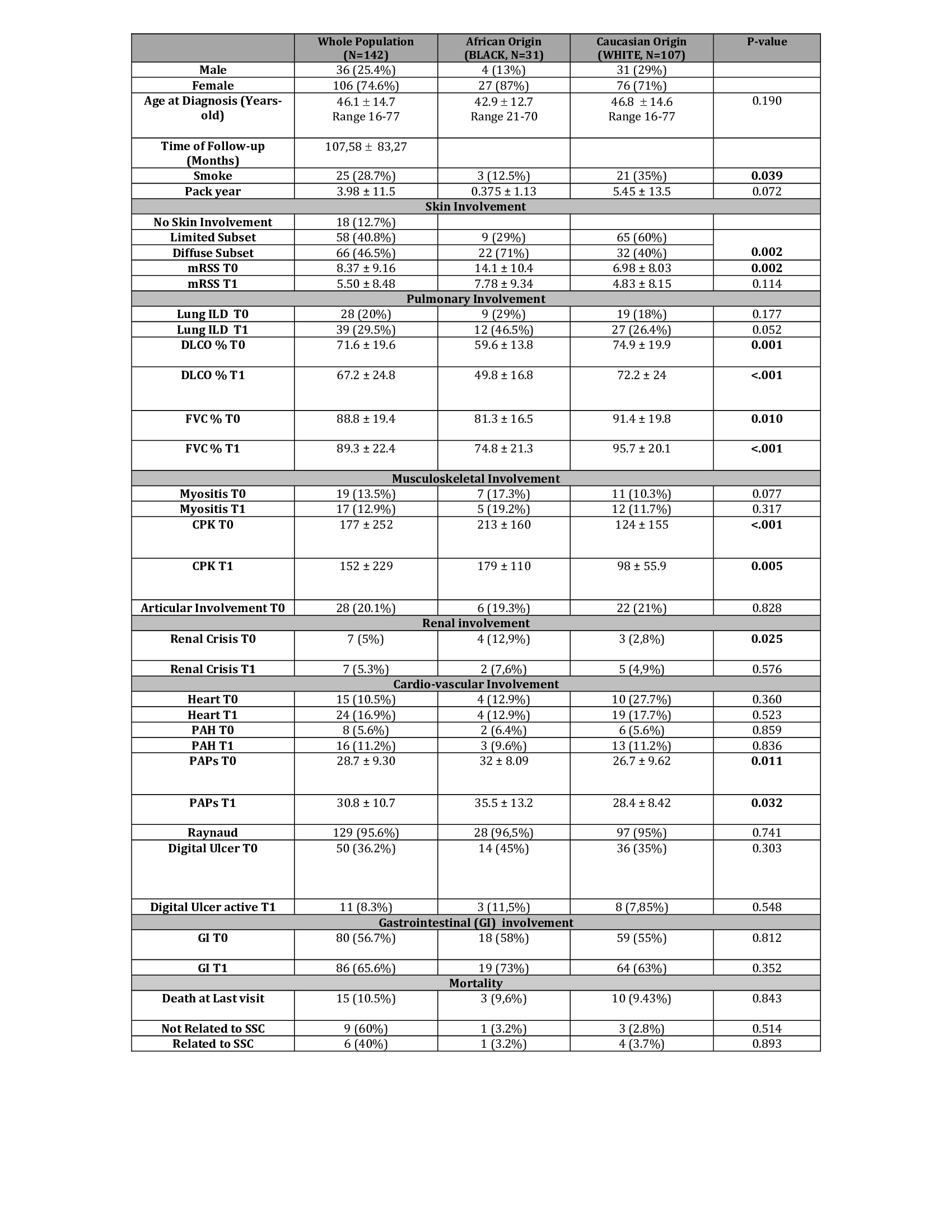Session Information
Session Type: Poster Session C
Session Time: 10:30AM-12:30PM
Background/Purpose: Anti-fibrillarin (AFA) auto-antibodies are rarely found in Systemic Sclerosis (SSc). Beyond the ethnic association with a higher prevalence in patients of Black ethnicity, the phenotype of AFA+ patients is poorly known. Our study aims at reporting the features of AFA+ SSc patients and analyzing the differences among ethnic groups.
Methods: We retrospectively evaluated the clinical data of patients from the first and last available visits in 16 European rheumatology SSc referral centers.
Results: A total of 142 AFA+ patients meeting the 2013 ACR-EULAR SSc classification criteria were recruited. It is of note that patients of Black ethnicity were 31 (22.5%) compared to 107 (77.5%) of White Caucasian origin. The mean duration of follow-up was 107.5 ± 83.2 months. Demographic and phenotype details are reported in Table 1, but the following highlights can be made. The diffuse cutaneous subset was more common in patients of Black origin: 22 (71%) compared to 32 (40%) (p = 0.002). Correspondingly, the baseline modified Rodnan Skin Score was 14.1 ± 10.4 for patients of Black origin versus 6.98 ± 8.03 for those of White origin (p < 0.002). Regarding major organ involvement, in the whole cohort, renal crisis was observed in 7 patients (5%), interstitial lung disease (ILD) in 28 (20%), heart involvement in 15 (10.5%), myositis in 19 (13.5%), arthritis in 28 (20%) and digital ulcers (DU) in 50 patients (36.2%). When differences related to ethnicity were considered, we observed that renal crisis was more common in patients of Black origin (13% versus 3%, p = 0.025). Similarly, ILD was more common although not significatively in Black ethnicity (29% versus 18% p=0.177) with forced vital capacity and diffusion lung CO significatively lower compared to White patients, indicating a more severe lung phenotype in Black patients (Table 1). Regarding cardiovascular aspects, Pulmonary Arterial Hypertension and cardiac involvement were similarly distributed among the two groups (6.4% and 28.6% in Black compared to 5.6% and 27.7% in White patients, respectively). DU were more frequent in Black (45%) compared to White individuals (35%). Regarding musculoskeletal involvement, myositis was present in 17% of Black patients compared to 10% of White (p = 0.077) showing a trend towards significance. Arthritis prevalence was similar into two groups. With regards to longitudinal data, the overall mortality rate was 10.5%, with SSc-related deaths accounting for 6 (40%) cases without any difference among the 2 ethnic groups although the low number of events precludes careful analyses.
Conclusion: Our study provides a detailed description of AFA+ SSc patients a poorly known SSc subset. AFA+ individuals of Black origin have significantly more severe disease, particularly with skin and pulmonary involvement, and a higher prevalence of renal crisis. This comprehensive analysis underscores the severe profile overall in AFA+ SSc patients and also the importance of considering ethnic differences in the clinical management. We are collecting additional data from AFA+ SSc patients through collaboration with additional centers from outside Europe to enlarge the series and explore whether ethnic differences also apply.
To cite this abstract in AMA style:
D'Alessandro R, Rodolfi S, Calot A, Bébéar L, Campochiaro C, Codullo V, Del Galdo F, Castellvi Barranco I, Zanatta E, Bellando Randone S, Boleto G, Raffray L, Chatelus E, Cacoub P, Le Joncour A, Airò P, sieiro santos c, Lescoat A, Avouac J, Denton C, Allanore Y. Features of Anti-Fibrillarin Positive Systemic Sclerosis Patients and Ethnic Differences: A European Multicenter Cohort [abstract]. Arthritis Rheumatol. 2024; 76 (suppl 9). https://acrabstracts.org/abstract/features-of-anti-fibrillarin-positive-systemic-sclerosis-patients-and-ethnic-differences-a-european-multicenter-cohort/. Accessed .« Back to ACR Convergence 2024
ACR Meeting Abstracts - https://acrabstracts.org/abstract/features-of-anti-fibrillarin-positive-systemic-sclerosis-patients-and-ethnic-differences-a-european-multicenter-cohort/

